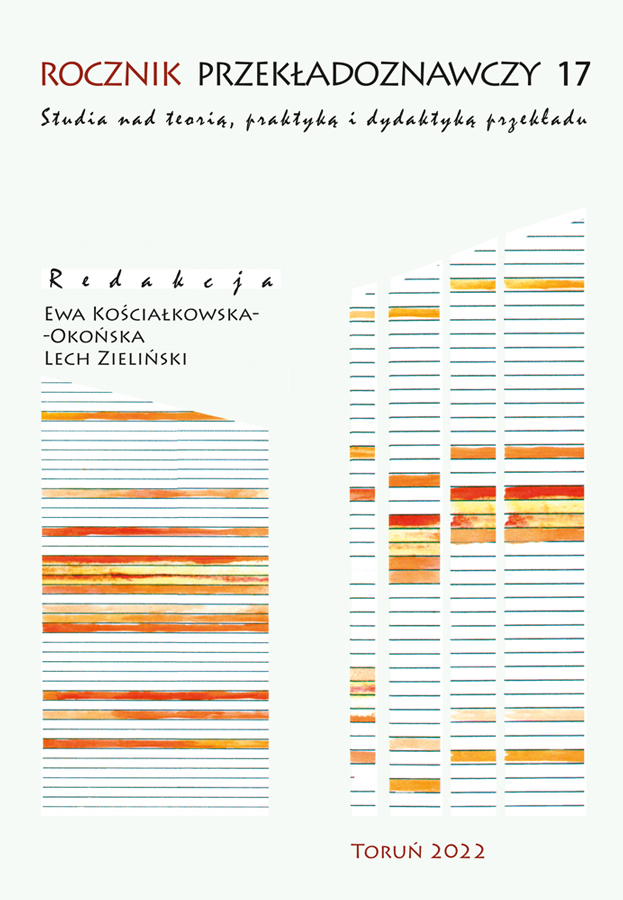The influence of the choices made by the translator of a philosophical text on the direction of its interpretation. Some comments on the translation of Panagiotis Kondylis’ book
DOI:
https://doi.org/10.12775/RP.2022.013Keywords
Panagiotis Kondylis, philosophical translationAbstract
The aim of this article is to demonstrate the importance of translator’s choices for the interpretation of the philosophical text in the target language. Referring to the translation of Panajotis Kondylis’ book Marx und die griechische Antike. Zwei Studien [Marx and Greek antiquity. Two Studies], the authors analyze selected terms occurring in the source text (das Ich, die Geschichtsphilosophie, schlecht) and describe the specific nature of translation of philosophical texts. The theoretical background deals with the philosophical text in the Polish research on translation represented by Ingarden, Rosnerowa, and Brzezińska. Authors’ observations on the universality of the phenomenon described are supported with multiple examples of philosophical works. Apart from that, the authors discuss alternative methods of their interpretation. The critical analysis of possible conceptual equivalents in the target language has shown that the translator of a philosophical text may have a significant (either conscious or even more frequently unconscious) impact on its interpretation. This can be attributed to the nature of philosophy, which since its origins has made use of its own lexical inventory.
References
Angehrn E., 1991, Geschichtsphilosophie, Stuttgart–Berlin–Köln.
Angehrn E., 2006, Filozofia dziejów, tłum. J. Marzęcki, Kraków.
Brzezicka B., 2018, Problematyka przekładu filozoficznego. Na przykładzie tłumaczeń Jacques’a Derridy w Polsce, Warszawa.
Chudy W., 2012, Refleksje heglowskie, Warszawa.
Hegel G.W.F., 1837, Philosophie der Geschichte, t. 1, Berlin.
Hegel G.W.F., 1958, Wykłady z filozofii dziejów, t. 1, tłum. J. Grabowski, A. Landman, Warszawa.
Horst R., Verykios K., Zieliński L., 2015, Obserwacja rzeczywistości a tworzenie teorii w myśli Panajotisa Kondylisa, „Studia z Historii Filozofii”, 3, s. 79–92.
Hume D., 1963, Traktat o naturze ludzkiej, t. 2, tłum. C. Znamierowski, Warszawa.
Ingarden R., 1955, O tłumaczeniach, [w:] O sztuce tłumaczenia, M. Rusinek (red.), Wrocław, s. 127–190.
Jakubowski M.N., 2004, Ciągłość historii i historia ciągłości. Polska filozofia dziejów, Toruń.
Kant I., 2012, Prolegomena do wszelkiej przyszłej metafizyki, która ma wystąpić jako nauka, [w:] Dzieła zebrane, t. 3, T. Kupś (red.), Toruń, s. 13–135.
Kondylis P., 1987, Marx und die griechische Antike. Zwei Studien, Heidelberg.
Kondylis P., 2020, Niewidoczna chronologia myśli. Trzy wywiady z Panajotisem Kondylisem, Toruń.
Kuderowicz Z., 1983, Filozofia dziejów, Warszawa.
Levý J., 2009, Przekład jako proces podejmowania decyzji, [w:] Współczesne teorie przekładu, P. Bukowski, M. Heydel (red.), Kraków, s. 72–85.
Marks K., 1966, Różnica między demokrytejską a epikurejską filozofią przyrody, Warszawa.
Moskalewicz M. 2013, Totalitaryzm, narracja, tożsamość. Filozofia historii Hannah Arendt, Toruń.
Panasiuk R., 1979, Dziedzictwo heglowskie i marksizm, Warszawa.
Rosnerowa H., 1975, Jedność filozofii i wielość języków, Warszawa.
Siemek M., 2017, Ja i inni. Problematyka intersubiektywności w filozofii transcendentalnej Fichtego, [w:] Dzieła. Fichte w kontekstach, t. 3, B. Działoszyński (red.), Warszawa, s. 163–180.
Skrzypek M., 2018, Historiozofia Voltaire’a między Bossuetem a Heglem, [w:] Filozofia historii. Voltaire, Warszawa, s. V–LXIX.
Wasyluk P. 2012, Filozofia dziejów, historiozofia czy filozofia historii? Próba definicji, „Diametros”, 6, s. 215–231.
Downloads
Published
Issue
Section
License
Copyright (c) 2022 Lech Zieliński, Patryk Głowacki

This work is licensed under a Creative Commons Attribution-NoDerivatives 4.0 International License.
Stats
Number of views and downloads: 633
Number of citations: 0



